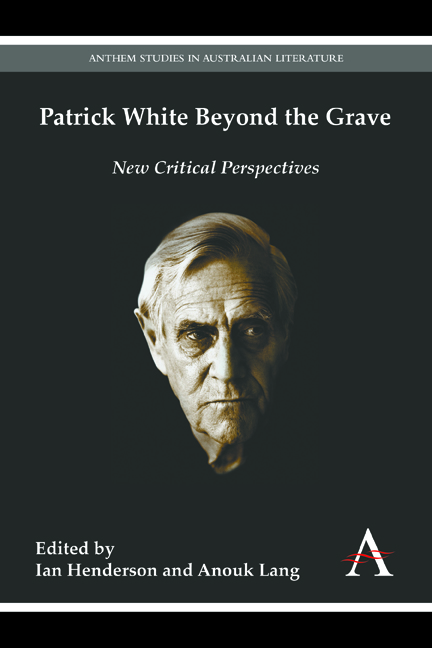Book contents
- Frontmatter
- Contents
- Acknowledgements
- Introduction
- Part I RESURRECTED PAPERS
- Part II MANY IN ONE
- Chapter 3 White's London
- Chapter 4 Elective Affinities: Manning Clark, Patrick White and Sidney Nolan
- Chapter 5 ‘Dismantled and Re-Constructed’: Flaws in the Glass Re-Visioned
- Chapter 6 Patrick White's Late Style
- Part III THE PERFORMANCE OF READING
- Part IV QUEER WHITE
- Contributors
- Index
Chapter 6 - Patrick White's Late Style
from Part II - MANY IN ONE
Published online by Cambridge University Press: 18 January 2018
- Frontmatter
- Contents
- Acknowledgements
- Introduction
- Part I RESURRECTED PAPERS
- Part II MANY IN ONE
- Chapter 3 White's London
- Chapter 4 Elective Affinities: Manning Clark, Patrick White and Sidney Nolan
- Chapter 5 ‘Dismantled and Re-Constructed’: Flaws in the Glass Re-Visioned
- Chapter 6 Patrick White's Late Style
- Part III THE PERFORMANCE OF READING
- Part IV QUEER WHITE
- Contributors
- Index
Summary
O God have mercy on all turds, whether dropped by elephants, goats or humans – Ameen.
– Patrick WhiteIf there is a dominant strain in recent Australian literary criticism, it probably involves the attempt to fuse postcolonialism and religion. Its key term is ‘the sacred’, and for many critics Patrick White looms large among those writers whose work most obviously embodies it. In his 1996 book on White, Simon During used the phrase ‘late colonial transcendentalism’ to describe White's gravitation to ‘the timeless and the spiritual’. Almost two decades later, a much more politically engaged conception of the spiritual has largely displaced the adversarial quality of During's approach. This is hardly surprising, given the specific pressures on the field of Australian literature. During's book mobilizes the resources of literary and critical theory partly to interrogate the social organization of White's canonicity and to reveal some of the ideological effects of his work. In the years since its publication, the field of Australian literature has had to rearticulate its relationship to a broader public sphere partly by stressing the importance of a national canon as a space within which to think through a range of issues bearing on the formation of a postcolonial culture and identity. And with considerable government and institutional support underpinning these efforts, symptomatic readings of figures that constitute the cornerstones of that canon have a questionable utility. At the same time, broader trends in the humanities have led to a gentle disquiet with the forms of hermeneutics that have dominated literary studies for a long time now. The shift that Hans Ulrich Gumbrecht describes in Production of Presence – away from the production of meaning premised on the division of subject and object, and towards the experience of ‘material presence’ – is generally congruent with much of the thinking that now drives recent Australian engagements with the sacred.
Today, White's readability, both inside and outside the specialized space of Australian literary studies, owes a great deal to the intersection of these frameworks. David Tacey's popular Edge of the Sacred, for instance, sees in White an important resource in the fashioning of a revivified sense of Australian spirituality, linked to the radical alterity of landscape and the rejection of largely secular, instrumentalized ways of knowing.
- Type
- Chapter
- Information
- Patrick White Beyond the GraveNew Critical Perspectives, pp. 117 - 128Publisher: Anthem PressPrint publication year: 2015



